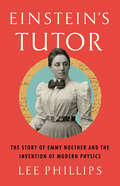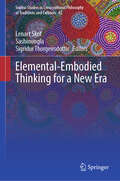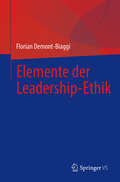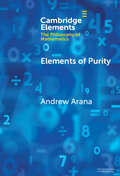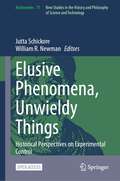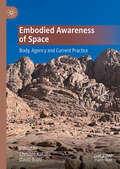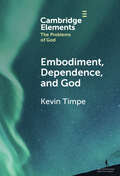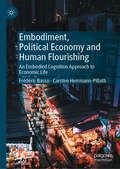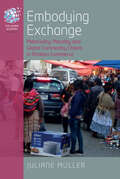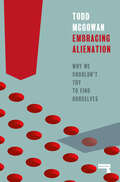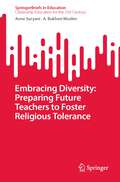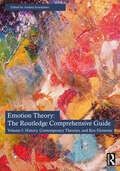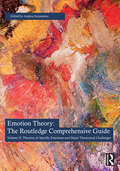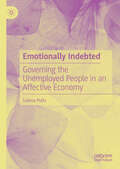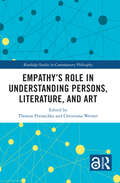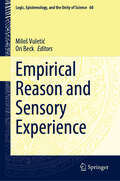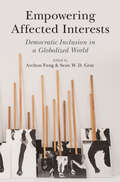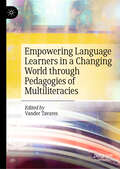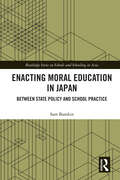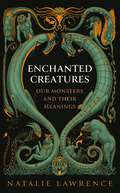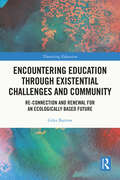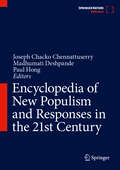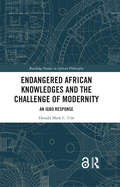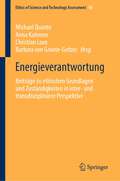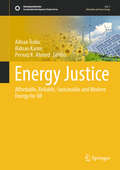- Table View
- List View
Einstein's Tutor: The Story of Emmy Noether and the Invention of Modern Physics
by Lee PhillipsA revelatory story of the woman who made foundational contributions to science and mathematics and persevered in the face of discrimination. Emmy Noether's mathematical genius enabled Einstein to bring his General Theory of Relativity–the basis of our current theory of gravity–to fruition. On a larger scale, what came to be known as &“Noether&’s Theorem&”—called by a Nobel laureate &“the single most profound result in all of physics&”—supplied the basis for the most accurate theory in the history of physics, the Standard Model, which forms our modern theory of matter. Noether&’s life story is equally important and revelatory in understanding the pernicious nature of sexual prejudice in the sciences, revealing the shocking discrimination against one of the true intellectual giants of the twentieth century, a woman effectively excluded from the opportunities given to her male counterparts. Noether&’s personality and optimistic spirit, as Lee Phillips reveals, enabled her unique genius to persevere and arrive at insights that still astonish those who encounter them a century later.
Elemental-Embodied Thinking for a New Era (Sophia Studies in Cross-cultural Philosophy of Traditions and Cultures #42)
by Lenart Škof Sigridur Thorgeirsdottir SashinunglaThis collection responds to widespread, complex, and current environmental challenges by presenting eleven original essays on a new elemental-embodied approach in environmental humanities. This approach has a special focus on elemental and indigenous philosophies as well as localized experiences of terrestrial forces: from earthquakes and eruptions to pandemics and natural disasters. Representing a shift in modern Western scientific and disembodied thinking of nature, this edited book approaches the question of relationality and intertwining of human and natural being by utilizing the elemental-embodied methodologies within philosophy of embodiment and nature. Supported by research in cognitive sciences, the contributors represent the experiential and affective turn within research into human cognition. As embodied, the human being is embedded and interacting with all there is. The aim of this edited volume is to indicate new paths toward regaining our access to natural being within usand thus toward reconnecting with the natural environment and the things and beings around us in a new, environmentally enhanced way. It appeals to researchers and students working in many fields, predominantly in philosophy, as well as religious and environmental studies.
Elemente der Leadership-Ethik
by Florian Demont-BiaggiDieses Buch begibt sich auf eine wissenschaftliche Suche, um die Eckwerte und Grundlagen einer Ethik der strategischen Führung zu finden und auszuarbeiten. Ausgehend vom Phänomen der Macht und des Machtmissbrauchs und seiner Beziehung zum Problem der Leadership entwickelt der Autor seine Führungsethik einerseits in der Auseinandersetzung mit Ansätzen aus der Sozialpsychologie, der Moral- und der allgemeinen Psychologie, der Psychotherapie und der Technikphilosophie, andererseits in der Kritik bereits etablierter Debatten, z. B. der Theorie der authentischen Führung. In das Buch gehen auch neuere Aspekte zum Thema ein, so die Frage nach der Digitalisierung als Führungswerkzeug.
Elements of Purity (Elements in the Philosophy of Mathematics)
by Andrew AranaA proof of a theorem can be said to be pure if it draws only on what is 'close' or 'intrinsic' to that theorem. In this Element we will investigate the apparent preference for pure proofs that has persisted in mathematics since antiquity, alongside a competing preference for impurity. In Section 1, we present two examples of purity, from geometry and number theory. In Section 2, we give a brief history of purity in mathematics. In Section 3, we discuss several different types of purity, based on different measures of distance between theorem and proof. In Section 4 we discuss reasons for preferring pure proofs, for the varieties of purity constraints presented in Section 3. In Section 5 we conclude by reflecting briefly on purity as a preference for the local and how issues of translation intersect with the considerations we have raised throughout this work.
Elusive Phenomena, Unwieldy Things: Historical Perspectives on Experimental Control (Archimedes #71)
by Jutta Schickore William R. NewmanThis open access book provides a historical treatment of scientific control in experimentation in the longue durée. The introduction distinguishes four related strands in the history of experimental control: the development of practices to stabilize experimental conditions; the career of the comparative design; the unfolding of methodological discussions about control practices and designs; and the history of the term “control”. Each chapter brings these distinctions to bear on specific historical episodes. The focus is on experiments with complex, elusive phenomena such as perception and learning, irregular movements, and unobservable elements. Such experiments bring control issues to the fore because they are difficult to design and stabilize and often controversial. Together, the chapters show that the local context shapes what exactly is controlled, how control can be accomplished, and how controls are justified. They also show that control strategies and methodological ideas often remain stable for a long time and change only gradually. This book, as well as the volume on analysis and synthesis in experimentation by the same editors, contains contributions by an array of experts from multiple disciplines, making it suitable for historians and philosophers of science and students alike.
Embodied Awareness of Space: Body, Agency and Current Practice
by David Boyd Christos KakalisThis edited volume explores the notion of embodied experience through a diverse range of disciplines: architecture, music, literature, performance studies, philosophy, geopolitics. In doing so, it illuminates the need to redefine the role of the human body as one of the protagonists for raising awareness of space-time issues through processing, experimentation and application of histories and theories of embodied awareness of space. Critically revisiting these spatio-temporal dialogues, this book suggests a method of linking theory, history and practice: past, present and future. The authors reinstate the significance of history and theory in creative thinking, and test their applicability in a number of different areas: theoretical and buildable architectural projects, mapping and geography, representation, and performative arts. This volume will appeal to students and scholars from architecture, art, cultural studies, landscape studies, media studies, and other disciplines in the humanities and social sciences.
Embodiment, Dependence, and God (Elements in the Problems of God)
by Kevin TimpeThe significance of our physical bodies is an important topic in contemporary philosophy and theology. Reflection on the body often assumes, even if only implicitly, idealizations that obscure important facts about what it means for humans to be 'enfleshed.' This Element explores a number of ways that reflection on bodies in their concrete particularities is important. It begins with a consideration of why certain forms of idealization are philosophically problematic. It then explores how a number of features of bodies can reveal important truths about human nature, embodiment, and dependence. Careful reflection on the body raises important questions related to community and interdependence. The Element concludes by exploring the ethical demands we face given human embodiment. Among other results, this Element exposes the reader to the wide diversity of human embodiment and the nature of human dependence, encouraging meaningful theological reflection on aspects of the human condition.
Embodiment, Political Economy and Human Flourishing: An Embodied Cognition Approach to Economic Life
by Carsten Herrmann-Pillath Frédéric BassoThis book presents embodied economics as a foundational alternative to behavioral economics and other projects integrating economics and psychology inspired by the computational paradigm. The 20th century witnessed the disembodiment of economic models through the intensification of mathematization and formal abstraction in economics. Even proponents of an embodied approach to cognition, such as Hayek, paradoxically championed the abstract market order as a disembodied superhuman intelligence. In the wake of groundbreaking perspectives in cognitive and social sciences, which have helped to rethink the fundamental building blocks of economics, agency and institutions, this title takes a radical turn towards embodiment. Reinstating economics as political economy, embodied economics motivates a critique of capitalism based on the analysis of disembodiment through abstraction and reactivates key critical insights into the anthropology put forward by the young Marx about contemporary economics and its conceptualizations of money, property, and labor. Based on this analysis, the authors envision a concrete utopia for an economic order centered on human dignity and care for life on Earth. This book contributes to recent discussions about behavioral, experimental and neuroeconomics and addresses a transdisciplinary audience in the social and behavioral sciences, philosophy, and the humanities.
Embodying Exchange: Materiality, Morality and Global Commodity Chains in Andean Commerce (The Human Economy #11)
by Juliane MüllerAddressing the infrastructural, legal and moral complexities in contemporary world trade, this book uses an ethnographic analysis of the interface of multinational brand manufacturers and popular traders in the Bolivian Andes. It offers a situated account of traders’ understanding of regulatory principles, and traces commercial dynamics beyond the limits of what we define as economic. It aims to humanize our understanding of the economy by grounding it in everyday life and morality.
Embracing Alienation: Why We Shouldnt Try to Find Ourselves
by Todd McgowanThe left views alienation as something to be resisted or overcome, but could it actually form the basis of our emancipation?In Embracing Alienation, Todd McGowan offers a completely different take on alienation, claiming that the effort to overcome it is not a radical response to the current state of things but a failure to see the constitutive power of alienation for all of us. Instead of trying to overcome alienation and accede to an unalienated existence, it argues, we should instead redeem alienation as an existential and political program.Engaging with Shakespeare&’s great tragedies, contemporary films such as Don&’t Worry Darling, and even what occurs on a public bus, as well as thinkers such as Descartes, Hegel, and Marx, McGowan provides a concrete elaboration of how alienation frees people from their situation. Relying on the tradition of dialectical thought and psychoanalytic theory, Embracing Alienation reveals a new way of conceiving how we measure progress — or even if progress should be the aim at all.
Embracing Diversity: Preparing Future Teachers to Foster Religious Tolerance (SpringerBriefs in Education)
by Anne Suryani A. Bukhori MuslimThis book presents a detailed discussion of Indonesian future teachers’ experience of religious diversity, tolerance and intolerance, their level of intellectual humility, and intentions to foster religious tolerance. Drawing from large-scale mixed methods research conducted in Indonesian universities involving over one thousand three hundred future teachers from diverse religious backgrounds, this book demonstrates that religion and religious beliefs can, and do, shape the way future teachers view their teaching practices and pedagogies. The book sheds light into the under-researched yet prominent issue of integrating tolerance into teacher education preparation. It is set in the largest Muslim-majority country in the world which, in recent years, has seen a gradual degradation of secularity while religion becomes more dominant across all levels and sectors of society. This novel and timely book is of interest to researchers, scholars, and students in religious studies, education, social sciences, and Asian studies, as well as anyone interested in the interplay between religion and education in the 21st century.
Emotion Theory: Volume I: History, Contemporary Theories, and Key Elements (Routledge Handbooks in Philosophy)
by Andrea ScarantinoEmotion Theory: The Routledge Comprehensive Guide is the first interdisciplinary reference resource which authoritatively takes stock of the progress made both in the philosophy of emotions and in affective science from Ancient Greece to today. A two-volume landmark publication, it provides an overview of emotion theory unrivaled in terms of its comprehensiveness, accessibility and systematicity.Comprising 62 chapters by 101 leading emotion theorists in philosophy, classics, psychology, biology, psychiatry, neuroscience and sociology, the collection is organized as follows:Volume I: Part I: History of Emotion Theory (10 chapters) Part II: Contemporary Theories of Emotions (10 chapters) Part III: The Elements of Emotion Theory (7 chapters) Volume II: Part IV: Nature and Functions of 35 Specific Emotions (22 chapters) Part V: Challenges Facing Emotion Theory (13 chapters) Special Elicitors of Emotions Emotions and Their Relations to Other Elements of Mental Architecture Emotions in Children, Animals and Groups Normative Aspects of Emotions Most of the major themes of contemporary emotion theory are covered in their historical, philosophical, and scientific dimensions. This collection will be essential reading for students and researchers in philosophy, psychology, neuroscience, sociology, anthropology, political science, and history for decades to come.
Emotion Theory: Volume II: Theories of Specific Emotions and Major Theoretical Challenges
by Andrea ScarantinoEmotion Theory: The Routledge Comprehensive Guide is the first interdisciplinary reference resource which authoritatively takes stock of the progress made both in the philosophy of emotions and in the affective sciences from Ancient Greece to today. A two-volume landmark publication, it provides an overview of emotion theory unrivaled in terms of its comprehensiveness, accessibility and systematicity.Comprising 62 chapters by 101 leading emotion theorists in philosophy, classics, psychology, biology, psychiatry, neuroscience and sociology, the collection is organized as follows:Volume I:Part I: History of Emotion Theory (10 chapters)Part II: Contemporary Theories of Emotions (10 chapters)Part III: The Elements of Emotion Theory (7 chapters)Volume II:Part IV: Nature and Functions of 35 Specific Emotions (22 chapters)Part V: Major Challenges Facing Emotion Theory (13 chapters) Special Elicitors of Emotions Emotions and Their Relations to Other Elements of Mental Architecture Emotions in Children, Animals, and Groups Normative Aspects of Emotions Most of the major themes of contemporary emotion theory are covered in their historical, philosophical, and scientific dimensions. This collection will be essential reading for students and researchers in philosophy, psychology, neuroscience, sociology, anthropology, political science, and history for decades to come.
Emotionally Indebted: Governing the Unemployed People in an Affective Economy
by Sabina PultzThis book explores the lived experience of unemployment from a critical social psychological perspective. It connects the condition of unemployment to governance structures and wider societal issues, such as the labor market tendencies of precarity and enterprise culture. Based on qualitative data collected in Denmark and America, the book gives voice to unemployed people to critically discuss both the intended and unintended consequences of active labor market measures, as well as the frequent moral evaluations that surround unemployment. The author explores how unemployed people make sense of and deal with the demands and activities required by activation policies or ALMPs, which tend to make the job seekers responsible for finding a solution to their condition. Building from the subjective experience of unemployment, it maps the complex emotional demands on jobseekers who should feel shame and self-blame but also display motivation and passion on the labor market. Presenting emotions and feelings as pivotal instruments of the governmentality of worklessness, this book addresses the lack of critical discussion and research into the unemployment experience and offers a useful, provocative perspective for students, scholars, and practitioners alike in social psychology, social policy, economic policy, and related disciplines.
Empathy’s Role in Understanding Persons, Literature, and Art (Routledge Studies in Contemporary Philosophy)
by Thomas Petraschka and Christiana WernerThis volume critically discusses the role empathy plays in different processes of understanding. More precisely, it clarifies empathy’s role in interpersonal understanding and appreciating works of literature and art. The volume also includes a section on historical theories of empathy’s role in understanding. When it comes to understanding other persons, empathy is typically seen as a process that enables the empathizer to recognize a target person’s mental states, a process which is in turn seen as “understanding” this person. This volume, however, explores empathy’s role in understanding beyond mere mental state recognition. With contributions on processes of interpersonal understanding and understanding of literature and art, it provides readers with an overview over both differences and similarities regarding empathy’s epistemic role in two rather different areas. Since important roots of the debate about empathic understanding lie at the end of the nineteenth and the beginning of the twentieth century, the historical section of the volume focusses specifically on this period. Empathy’s Role in Understanding Persons, Literature, and Art will appeal to scholars and advanced students working in the philosophy of mind, epistemology, aesthetics and the history of philosophy, as well as in literary studies and art history.
Empirical Reason and Sensory Experience (Logic, Epistemology, and the Unity of Science #60)
by Miloš Vuletić Ori BeckThe volume offers a lively and wide-ranging debate on the major questions of perceptual epistemology, including how perceptual experiences can bestow positive epistemic standing to empirical judgments and beliefs; the relative epistemic import of veridical and non-veridical perceptual experiences; the relation between experience and knowledge; and the nature of experience in view of its epistemic linkages to discursive contents. The volume is centered around five cutting-edge essays by leading authors in these areas—Anil Gupta, Andrea Kern, Christopher Peacocke, Susanna Schellenberg and Crispin Wright—along with no less than thirty contributions scrutinizing and critically discussing the essays, prompting detailed rejoinders from the lead authors. The volume closes with an extensive debate between Annalisa Coliva, Gupta and Wright. Taken as a whole, the volume covers much ground in epistemology of perception and displays a variety of approaches and perspectives through fruitful and accessible exchanges. It will be of interest not only to researchers working in perceptual epistemology but also to students new to the subject.
Empowering Affected Interests: Democratic Inclusion in a Globalized World
by Archon Fung Gray, Sean W. D.Many demands for democratic inclusion rest on a simple yet powerful idea. It's a principle of affected interests. The principle states that all those affected by a collective decision should have a say in making that decision. Yet, in today's highly globalized world, the implications of this 'All-Affected Principle' are potentially radical and far-reaching. Empowering Affected Interests brings together a distinguished group of leading democratic theorists and philosophers to debate whether and how to rewrite the rules of democracy to account for the increasing interdependence of states, markets, and peoples. It examines the grounds that justify democratic inclusion across borders of states, localities, and the private sector, on topics ranging from immigration and climate change to labor markets and philanthropy. The result is an original and important reassessment of the All-Affected Principle and its alternatives that advances our understanding of the theory and practice of democracy. This title is also available as Open Access on Cambridge Core.
Empowering Language Learners in a Changing World through Pedagogies of Multiliteracies
by Vander TavaresThis book presents conceptual and empirical studies on how pedagogies of multiliteracies can empower language learners, teachers, and teacher educators in an increasingly globalized yet unequal world, with a focus on social justice in language education. The chapters offer critical and innovative pedagogical insights that contribute to re-envisioning language and literacy education in the 21st century in a number of educational contexts, including post-secondary, community, refugee, science, language, and teacher education. From a raciolinguistic critique of monoglossic education in the United States to drama-based pedagogies for refugee learners in Iceland, this book contextualizes language learner empowerment by identifying and confronting ideologies of race, gender, nationality, and language. Creative multimodal and multisensorial pedagogies are enacted through learner-designed plurilingual portfolios, infographics, picturebooks, identity texts, performance, andmuseum-based learning. This book diversifies and enriches current approaches to language education based on pedagogies of multiliteracies that cultivate learner agency, identity, and critical reflection, and it will be of interest to readers with backgrounds in second/foreign language education, TESOL/ESL, sociology of education, and applied linguistics.
Enacting Moral Education in Japan: Between State Policy and School Practice (Routledge Series on Schools and Schooling in Asia)
by Sam BamkinDrawing on the case of moral education reform, this book provides an authoritative picture of how policy is enacted between state policymaking and school practice in Japan, focusing on how national policy is enacted locally in the classroom. The study follows the 2015 moral education reform from its genesis in central government, through the Ministry of Education to its enactment by local government and schools. The book looks beyond written policies, curricula and textbooks to examine how teachers, school administrators and others make sense of, and translate, policy into practice in the Japanese classroom context. Chapters explore how moral education practice has changed in response to the intentions of national policy, and analyzes the implications for understanding processes of policy enactment in the Japanese education system. This book presents a new perspective on the complexity of education policy making, practice, and the gaps in between. It will be of interest to postgraduate students, researchers, and academics in the fields of education policy and politics, moral education, school administration, and international and comparative education more broadly, particularly in Asia.
Enchanted Creatures: Our Monsters and Their Meanings
by Natalie LawrenceThe hydra rears its many heads in a flurry of teeth and poisonous fumes. The cyborg lays waste to humanity with a ruthless, expressionless stare.From ancient mythology to modern science fiction, we have had to confront the monsters that lurk in the depths of our collective imagination. They embody our anxieties and our irrational terrors, giving form to what we don't wish to know or understand. For millennia, monsters have helped us to manage the extraordinary complexity of our minds and to deal with the challenges of being human.In Enchanted Creatures, Natalie Lawrence delves into 15,000 years of imaginary beasts and uncovers the other-worldly natural history that has evolved with our deepest fears and fascinations. Join Lawrence on a tour of prehistoric cave monsters, serpentine hybrids, deep-sea leviathans and fire-breathing Kaiju. Discover how this monstrous menagerie has shaped our minds, our societies and how we see our place in nature.
Encountering Education through Existential Challenges and Community: Re-connection and Renewal for an Ecologically based Future (Theorizing Education)
by Giles BarrowDirectly inspired by Indian British activist Satish Kumar’s 2013 seminal work ‘Soil, Soul and Society’, this book rethinks education in line with thoughts around the current climate crisis, the purpose of education in a post-pandemic world, and the mental health of children, teachers and youth across societies. Acknowledging the realities of a world battling with the after effects of COVID-19, the author envisions a future for education that realises real-world solutions to contemporary existential, ecological and societal challenges that might otherwise be limited to an imaginary or idealist space. Offering a novel approach through a combination of narrative-based inquiry and auto-ethnographic study, the book provides a synthesis of ideas from both Kumar and political philosopher Hannah Arendt not usually linked to debates in sustainability education. Ultimately providing a critique of a predominantly Western-orientated, global education movement, this interdisciplinary book will appeal to scholars, researchers, and post-graduate students involved in education theory and the philosophy of education, as well as indigenous and sustainability education more broadly.
Encyclopedia of New Populism and Responses in the 21st Century
by Paul Hong Joseph Chacko Chennattuserry Madhumati DeshpandeThis book mainly seeks to explain, define and update the recurring forms of populism in the 21st century. Examples used in this Introduction are limited to English speaking countries. But populism's existent expressions are ecumenically global. Like any long-lasting perennial organism it is sturdy and comes in a variety of forms adaptable to environmental changes. In political or cultural terms its expression has been neither exclusively left, center, nor right. Populism contains multitudes, dates back centuries before it was identified with its modern name. Populism has become a hot button issue in the recent times. The UK's Sunday heavy The Guardian published about 300 articles in 1998 that used the term "populism" or "populist" and by 2016 its use had skyrocketed to over 2,000. And growing. Probably the single greatest catalyst to date that injected populism into the world's Internet common discourse, that infused it into journalism right, left and centerand awakened populist political activism was the Great Recession of 2007-08 and the subsequent global deprivations it engendered. In today's world populism promises to remain and renew its intensity due to the covid-19 pandemic's deleterious effects on most nations middle and low-income groups, specially minorities. These are some reasons among many why it is time for populism to be relocated, identified and given refreshed 21st understandings. It has a shifting nature among people, events, causes that constantly demands fresh studies. It is a social and cultural phenomenon both universal and particular. In our 21st century world it is a product of our shared cultures and each our own exceptional deep culture. This Encyclopedia is unique in its composition as it includes all the major disciplines of Social Sciences and thus will be a one stop source of nine different disciplines looking at new populism.
Endangered African Knowledges and the Challenge of Modernity: An Igbo Response (Routledge Studies in African Philosophy)
by Donald Mark UdeThis book presents an innovative African philosophical response to coloniality and the attendant epistemicide of Africa’s knowledge systems, drawing on Igbo thinking.This book argues that theorizing modernity requires a critical conversation between African and Western scholarship, in order to unpack its links with coloniality and the subjugation of Africa’s indigenous knowledges. In setting out this discussion, the book also connects with Latin American scholarship, demonstrating how the modern world is structured to marginalize and destroy knowledges from across the Global South. This book draws on Igbo epistemic resources of solidarity thinking, positioned in contrast to capitalist knowledge-patterns, thereby providing an important Africa-driven response to modernity and coloniality. This book concludes by arguing that the Igbo sense of solidarity is useful and relevant to modern contexts and thus constitutes a vital resource for a less disruptive, more balanced, and more wholesome modernity.At a time of considerable global crises, this book makes an important contribution to philosophy both within Africa and beyond.
Energieverantwortung: Beiträge zu ethischen Grundlagen und Zuständigkeiten in inter- und transdisziplinärer Perspektive (Ethics of Science and Technology Assessment #50)
by Michael Quante Anna Kahmen Christian Loos Barbara von Groote-GotzesDer Band widmet sich der Frage, wer verantwortlich ist für einen ethisch angemessenen Umgang mit Energie. Dazu sollen zunächst in einem ersten Schritt die normativen Grundlagen von Energieverantwortung skizziert werden. In einem zweiten Schritt werden mögliche Spannungsfelder identifiziert, die in verschiedenen gesellschaftlichen, wirtschaftlichen und politischen Dimensionen bestehen. In einem abschließenden dritten Schritt wird die Perspektive auf Probleme erweitert, die durch die Implementierung energieverantwortlicher Maßnahmen und Bestrebungen entstehen. So leistet der Band eine Ordnung der Fragen rund um Energieverantwortung sowie die Darstellung, Bewertung und Lösung konkreter Handlungsprobleme im Feld der Energie-Nachhaltigkeit.
Energy Justice: Affordable, Reliable, Sustainable and Modern Energy for All (Sustainable Development Goals Series)
by Adnan Trakic Pervaiz K. Ahmed Ridoan KarimThis book delves into the pressing issue of energy justice as it relates to SDG 7 and its far-reaching implications for society. With a comprehensive exploration of various aspects, from reducing energy burdens to political considerations, environmental justice, and human rights, this thought-provoking collection of chapters offers a profound understanding of the challenges and potential solutions surrounding energy justice. Starting with an introduction to the concept of energy justice and its significance, the editors lay the groundwork for an engaging discourse. The book then delves into the disproportionate energy burdens faced by low-income communities, shedding light on the difficult choices they must make to meet their basic needs. It further examines the intricate interplay between energy justice, politics, and environmental concerns, striving to find a harmonious balance. Drawing from a diverse range of perspectives, the chapters explore the intersection of energy justice with human rights, analyzing its implications for countries worldwide. The book also investigates the influence of disruptive events on renewable energy programs, presents an Islamic perspective on energy justice, and highlights the roles of the financial sector, fossil fuel industry, nuclear energy sector, and energy technology innovation in mitigating energy injustice. Chapter 'The Role of the Financial Sector in Energy Justice' is available open access under a Creative Commons Attribution 4.0 International License via link.springer.com.
